Wikipedia:Picture of the day/February 2010
|
Featured picture tools: |
These featured pictures, as scheduled below, appeared as the picture of the day (POTD) on the English Wikipedia's Main Page in February 2010. Individual sections for each day on this page can be linked to with the day number as the anchor name (e.g. [[Wikipedia:Picture of the day/February 2010#1]] for February 1).
You can add an automatically updating POTD template to your user page using {{Pic of the day}} (version with blurb) or {{POTD}} (version without blurb). For instructions on how to make custom POTD layouts, see Wikipedia:Picture of the day.Purge server cache
February 1

|
A portrait of George Washington Carver, American scientist, botanist, educator and inventor, from 1942. Much of Carver's fame is based on his research into and promotion of alternative crops to cotton, such as peanuts and sweet potatoes. In addition to his work on agricultural extension education for purposes of advocacy of sustainable agriculture and appreciation of plants and nature, Carver's important accomplishments also included improvement of racial relations, mentoring children, poetry, painting, and religion. One of his most important roles was in undermining, through the fame of his achievements and many talents, the widespread stereotype of the time that the black race was intellectually inferior to the white race. Photo: Arthur Rothstein; Restoration: Lise Broer
Recently featured:
|
February 2

|
|
The promenade along the beach in Brighton, a seaside town in the city of Brighton and Hove in East Sussex on the south coast of Great Britain. It emerged as a health resort during the 18th century and became a destination for day-trippers after the arrival of the London and Brighton Railway in 1841. Photo credit: David Iliff
Recently featured:
|
February 3
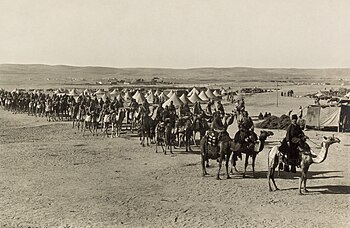
|
The Ottoman camel corps at Beersheba before the First Suez Offensive of World War I. Although the main thrust of the offensive on February 3, 1915, was unsuccessful in capturing the Suez Canal, the Ottoman army achieved its objective because the British were forced to keep more troops in Egypt than they had expected. Photo: American Colony; Restoration: Lise Broer
Recently featured:
|
February 4

|
A New Holland Honeyeater (Phylidonyris novaehollandiae), a honeyeater species native to southern Australia, sitting on a flowering stalk of Phormium tenax with its crown dusted by pollen. It was the first bird to be scientifically described in Australia. It is around 18 cm (7.1 in) long, is mainly black, with a white iris, white facial tufts and yellow margins on its wing and tail feathers. Photo credit: Noodle snacks
Recently featured:
|
February 5

|
|
A ripe passionfruit and the cross-section of another. Passionfruits are the fruit of the passion flower vine species Passiflora edulis, which is native to Brazil and northeastern Argentina, but is now cultivated commercially in frost-free areas in many countries for its fruit. Passionfruit comes in two varieties: purple (seen here), which is usually smaller than a lemon, and yellow, which is about the size of a grapefruit. Photo credit: Fir0002
Recently featured:
|
February 6
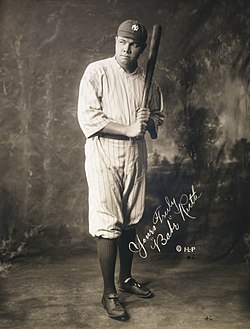
|
A 1920 autographed photo of American baseball player Babe Ruth (1895–1948), regarded as one of the greatest sports heroes in American culture. The popularity of the game exploded in the 1920s, largely due to his hitting prowess, which led to escalating home run totals that not only excited fans, but helped baseball evolve from a low-scoring, speed-dominated game to a high-scoring power game. He began his Major League career in 1914 as a pitcher with the Boston Red Sox. By the time he was sold to the New York Yankees in 1919, he had become a full-time hitter. After Ruth's sale, the hugely successful Red Sox did not win another World Series title for 86 years, and the Yankees became one of the winningest franchises in North American professional sports. Photo: Irwin, La Broad, & Pudlin; Restoration: Lise Broer
Recently featured:
|
February 7

|
In gridiron football, the quarterback is the leader of the offensive team. At most levels, but especially at the college and professional level, the quarterback is one of the most visible and important roles on the team, being responsible both for calling plays and making decisions during the play. Shown here is Shea Smith of the Air Force Falcons during the 2007 Armed Forces Bowl. Photo credit: Mike Kaplan, USAF
Recently featured:
|
February 8

|
Morchella conica, a species of morel mushroom. Morels are known for their distinctive appearance, not unlike a honeycomb in that the upper portion is composed of a network of ridges with pits between them. The ascocarps are prized by gourmet cooks, particularly for French cuisine. However, morels have not yet been successfully farmed on a large scale, and the commercial morel industry is largely based on harvest of wild mushrooms. Photo credit: Beentree
Recently featured:
|
February 9

|
The inchman (Myrmecia forficata) is a species of bulldog ant that is native to southeastern Australia and Tasmania, so named because of its size (growing up to nearly 1 in or 25 mm in length). The inchman is a carnivore and a scavenger. They sting their victims with venom, which is among the most powerful in the insect world. Photo credit: Noodle snacks
Recently featured:
|
February 10

|
Kishū Kumano iwatake tori by Hiroshige II, a Japanese woodblock print in the ukiyo-e style, depicting the harvesting of iwatake mushrooms (Umbilicaria esculenta) near Kumano in the Kishū Domain. Actually a lichen that grows on rocks, iwatake (literally, "rock mushroom") are used in East Asia as both a food source and medicine. Restoration: Adam Cuerden
Recently featured:
|
February 11

|
Thomas Edison (1847–1931) was an American inventor, scientist and businessman who developed many devices that greatly influenced life around the world, including the phonograph, the motion picture camera, and a long-lasting, practical electric light bulb. Dubbed "The Wizard of Menlo Park" (now Edison, New Jersey) by a newspaper reporter, he was one of the first inventors to apply the principles of mass production and large teamwork to the process of invention, and therefore is often credited with the creation of the first industrial research laboratory. Edison is considered one of the most prolific inventors in history, holding 1,093 U.S. patents in his name, as well as many patents in the United Kingdom, France and Germany. Photo: Bachrach Studios; Restoration: Michel Vuijlsteke
Recently featured:
|
February 12

|
Gypsum, a common mineral composed of calcium sulfate dihydrate, in its crystallised selenite form. In addition to selenite, it may also occur in a silky, fibrous form called "satin spar", and a very fine-grained white variety is called alabaster. In arid areas, it can also occur in a flower-like form called desert rose. In the form of selenite, gypsum forms some of the largest crystals found in nature, up to 11 m (36 ft) long. Photo credit: Noodle snacks
Recently featured:
|
February 13
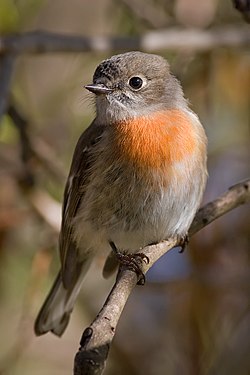
|
The Scarlet Robin (Petroica boodang, female shown here) is a common red-breasted Australasian robin. It is endemic to Australia, where it is found near the coast from southern Queensland to central South Australia, Tasmania and south west Western Australia. It is a stocky passerine bird with a large head. It ranges in size from 12 to 13.5 cm (4.7 to 5.3 in) in length and weighs between 12 and 14 g (0.4 and 0.5 oz). Photo credit: Fir0002
Recently featured:
|
February 14
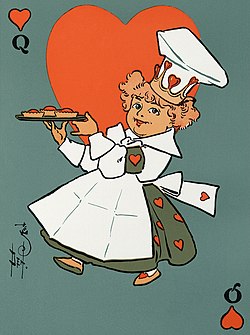
|
William Wallace Denslow's illustration of the poem "The Queen of Hearts" from a 1901 issue of Mother Goose. The poem was originally published in 1782 as part of a set of four playing card based poems, but proved to be far more popular than the others. By 1785 it had been set to music, and it forms the basis of the plot of Lewis Carroll's Alice in Wonderland, Chapter XI: "Who Stole the Tarts?" Although it was originally published in a magazine for adults, it is now best known as a nursery rhyme. Restoration: Lise Broer
Recently featured:
|
February 15
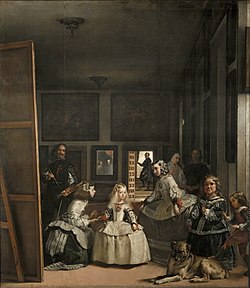
|
Las Meninas ("The Maids of Honour") is a 1656 painting by Diego Velázquez, the leading artist of the Spanish Golden Age, showing a large room in the Royal Palace of Madrid, and presents several figures, most identifiable from the Spanish court. Some look out of the canvas towards the viewer, while others interact among themselves. The young Infanta Margarita is surrounded by her entourage of maids of honour, chaperone, bodyguard, two dwarfs and a dog. Just behind them, Velázquez portrays himself working at a large canvas. Las Meninas has long been recognised as one of the most important paintings in Western art history and has been one of the most widely analysed works in Western painting.
Recently featured:
|
February 16
|
A plasma globe is a novelty item that consists of a glass orb filled with a mixture of various gases. A smaller orb in its center serves as an electrode and plasma filaments extend from the inner electrode to the outer glass shell, giving the appearance of multiple constant beams of colored light. Film credit: Geni
Recently featured:
|
February 17

|
"The Gerry-Mander", an editorial cartoon from 1812 depicting the boundaries of what was considered an oddly-shaped congressional district in the U.S. state of Massachusetts, a process known today as gerrymandering. The shape was set by the state legislature to favor the candidates of incumbent Governor Elbridge Gerry's Democratic-Republican Party over those of the Federalists, and the term is a portmanteau of Gerry and salamander. Artist: Elkanah Tisdale
Recently featured:
|
February 18

|
An engraving of action from Act I, Scene 1 from William Shakespeare's The Tempest, in which Prospero (right) has caused the ship carrying his brother Antonio and the King of Naples Alonso to run aground on the island to which he and his daughter Miranda had been exiled. The play is believed to have been written in 1610–11 and is now considered to be one of Shakespeare's greatest works. Engraving: B. Smith; Artist: George Romney; Restoration: Adam Cuerden
Recently featured:
|
February 19

|
The Glistening Demoiselle (Phaon iridipennis) is a damselfly species found throughout much of Africa. Its natural habitats are moist lowland forests, dry and moist shrubland, rivers, and intermittent rivers in tropical and subtropical areas. Photo credit: Muhammad Mahdi Karim
Recently featured:
|
February 20

|
"The Journey", an illustration depicting a young boy absorbed in watching the scenery from his seat in a railway car. The painting was done for a series of poems by Josephine Preston Peabody entitled "The Little Past", which relate experiences of childhood from a child's perspective. Children's literature in general is often illustrated, sometimes lavishly, in a way rarely used for adult literature outside illustrated fiction. Generally, the artwork plays a greater role in books intended for the youngest readers (especially pre-literate children). Children's picture books can be a cognitively accessible source of high quality art for young children. Artist: Elizabeth Shippen Green; Restoration: Lise Broer
Recently featured:
|
February 21

|
An illustration of the pharyngeal jaws of a moray eel, a "second set" of jaws contained within an animal's pharynx, distinct from the primary (oral) jaws. When the moray bites prey, it first bites normally with its oral jaws, capturing the prey. Immediately thereafter, the pharyngeal jaws are brought forward and bite down on the prey to grip it; they then retract, pulling the prey down the eel's esophagus, allowing it to be swallowed. Image: Zina Deretsky, NSF; SVG conversion: Pbroks13
Recently featured:
|
February 22

|
Siegmund "Zishe" Breitbart (1893–1925), shown here pulling a heavy weight using only his teeth, was a Polish strongman and circus performer who was known as the "Strongest Man in the World" during the 1920s. He was widely popular in both Europe and the U.S., but died at the age of 32 after an accident during a performance. Photo: National Photo Co.
Recently featured:
|
February 23
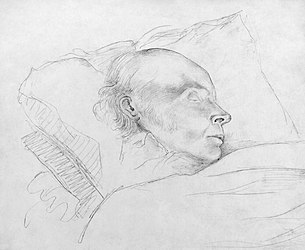
|
A sketch of John Quincy Adams, the sixth President of the United States, on his deathbed. The son of President John Adams, he was the first President (of two) who served in Congress after his term. Adams collapsed due to cerebral hemorrhage after a debate in the House of Representatives, and died two days later on February 23, 1848. Artist: Arthur J. Stansbury; Restoration: Lise Broer
Recently featured:
|
February 24

|
The asci of a Morchella elata morel mushroom, as seen with phase contrast microscopy (the total field of view is 218 × 164 µm). An ascus is a capsule containing the sexual ascospores produced in ascomycete fungi. The shape of the ascus is important for species classification within the Ascomycota phylum. Photo credit: Peter G Werner
Recently featured:
|
February 25

|
Enrico Caruso (1873–1921) was an Italian tenor who was one of the most famous male opera singers in history. He sang to great acclaim at major opera houses around the world, and spent 18 consecutive seasons as the lead tenor at the Metropolitan Opera in New York City. He was one of the first major classical vocalists to make numerous recordings (more than 260), and his 1902 recording of "Vesti la giubba" was the first to sell over a million copies. His records sold so well that the Collector's Guide to Victor Records asks, "Did the phonograph make Caruso, or did Caruso make the phonograph?" Photo: Bain News Service; Restoration: Michel Vuijlsteke
Recently featured:
|
February 26
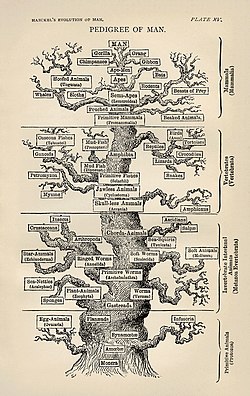
|
Ernst Haeckel's "Tree of Life" from his 1879 book The Evolution of Man, which depicts a literal interpretation of Charles Darwin's metaphorical description of the pattern of universal common descent. In early evolutionary thought, humans were considered the pinnacle of evolution, and thus "Man" is at the crown of the tree. In the modern synthesis, evolution is understood to be an ongoing process with no defined endpoint. The tree of life is still considered valid for eukaryotes, but prokaryotic life forms are capable of horizontal gene transfer, meaning that the concept gives an incomplete picture of life's evolution. Restoration: Ragesoss
Recently featured:
|
February 27
|
The Queen Elizabeth II Bridge, which connects Kent to Essex as part of the Dartford Crossing, seen here from Greenhithe, 2.5 km (1.6 mi) east of the bridge. At 137 m (449 ft) high and 812 m (2,664 ft) long, the bridge was Europe's largest cable-stayed bridge when it opened in 1991. It is currently the second largest in the United Kingdom and the 34th largest in the world. Photo credit: David Iliff
Recently featured:
|
February 28

|
The emerald cockroach wasp (Ampulex compressa) is an entomophagous parasite wasp species which is known for its unusual reproductive behavior. The female will capture a live cockroach by stinging it twice, first to paralyze it and the second to disable the roach's escape reflex. After the roach recovers, it is taken to the wasp's burrow, where the wasp lays an egg inside the roach's abdomen. With no escape reflex, the roach will simply rest there. After the larvae hatch a few days later, they will devour the roach from the inside. Photo credit: Muhammad Mahdi Karim
Recently featured:
|
Picture of the day archives and future dates

